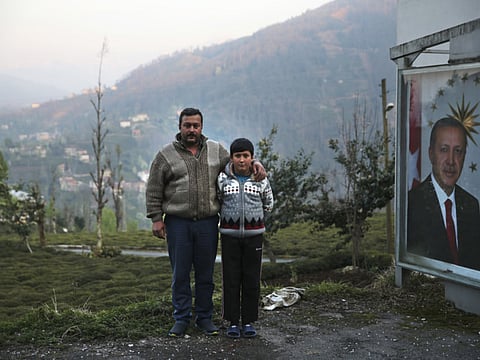Erdogan: Autocrat or protector of the underpriviliged?
Turkish leader’s power is derived as much from what he promises and provides to his supporters as from how he frightens his critics

Turkish President Recep Tayyip Erdogan has increasingly made himself the face of Turkey’s state, and now he is seeking more authority to rule. This is the fifth and final part of the State of Emergency series.
“We would sacrifice our lives for Tayyip Erdogan,” Zeynep Dalkilic, 65, said as a vendor strolled by with a cloud of cotton candy. Another woman started to cry when asked what she thought of the president.
There was an upbeat, carnival atmosphere as local residents prepared to welcome a man most of them identified with. “He is one of us,” said Hassan Birgun, a 59-year-old retired salesman.
So what is the nature of Erdogan’s appeal and his power, and who would vote to expand it?
He has certainly wielded fear as an effective tool. His government has jailed more journalists than any other country, and even some of those who have criticised him on social media have found themselves prosecuted. He has purged around 130,000 from their jobs and arrested more than 40,000 since the failed coup last summer, but Erdogan’s power is derived as much from what he promises and provides to his supporters as from how he frightens his critics.
To his admirers, Erdogan is still someone who provides more stability than division. They see his proposals to expand the powers of the presidency as a path to greater security rather than a slippery slope toward one-man rule.
To Dalkilic, a former farm labourer, Erdogan is the man who expanded welfare programmes, keeping her from poverty after her husband died.
Hulya Cataloglu, a former teacher attending the rally with her two children, says Erdogan improved the city hospital, built better roads and raised the standard of local schools. She believes that increasing the president’s powers would improve the quality of state infrastructure. “He is the best person for this country,” she said.
Erdogan’s threats to Europe, which are viewed with alarm in Berlin and Brussels, sound more comforting to his supporters at home. In Kastamonu, several approved of how the president is standing up for Turkey. “If everyone’s attacking him,” said Zeynep Acar, an 18-year-old undergraduate, “he must be doing something right.”
While thousands at Kastamonu waited for Erdogan’s arrival, one of his ministers, Mehmet Ozhaseki, introduced him as the “only one who resisted the old regime.”
It’s a reminder that, though some consider him an oppressor, others frame him — simplistically, perhaps — as a protector from the old establishment they blame for sidelining Turkey’s pious majority for decades. In the years since, many from that part of Turkish society have improved their quality of life and social standing.
“With Erdogan,” said Yousuf Parlayan, a retired factory worker in Kastamonu, “we buried the idea that the vote of a shepherd on the mountain was worth less than the vote of someone in the city.”
Erdogan’s appeal also derives from how he has increased space — both physically and metaphorically — for Islam in public life. He says he intends to cultivate a more pious generation of Turks. He has opened scores of religious schools, and removed restrictions on Islamic headscarves for women in universities, the army and the civil service.
Through it all, he has persuaded enough voters that his measures are about increasing religious freedom, rather than eliminating the gap between religion and the state. Erdogan’s Turkey has not harmed secularism, but rather has become “more inclusive,” argued an approving Cataloglu.
“When I went to university, my friends couldn’t come to class because they wore headscarves,” said Cataloglu, who doesn’t wear one, but whose mother and mother-in-law do. “Now a head-scarfed woman can work anywhere she wants.”
Many worry all that will be reversed if Erdogan somehow leaves office.
Sign up for the Daily Briefing
Get the latest news and updates straight to your inbox



